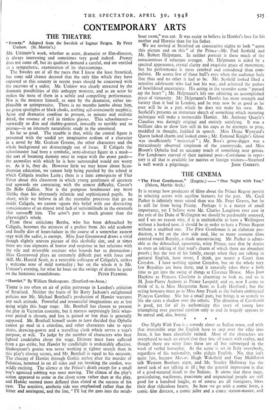CONTEMPORARY ARTS
THE THEATRE
"Frenzy." Adapted from the Swedish of Inginar Bergen. By Peter Ustinov. (St. Martin's.) MR. USTINOV'S work, whether as actor, dramatist or film-director, is always interesting and sometimes very good indeed. Frenzy does not come off, but its qualities demand a careful, and are entitled to a sympathetic, examination of its shortcomings.
The Swedes are of all the races that I knew the least frenetical, but some odd chance decreed that the only film which they have exported to this country in recent years should be concerned with the excesses of a sadist. Mr. Ustinov was clearly attracted by the dramatic possibilities of this unhappy monster, and as an actor he makes the most of them in a subtle and compelling performance. Nor is the monster himself, as seen by the dramatist, either im- plausible or unimpressive. There is no mumbo jumbo about him, no green spotlights or black cloaks, nothing self-consciously mephitic. Actor and dramatist combine to present, in minute and realistic detail, the essence of evil in rimless glasses. This schoolmaster— outwardly so dim and shabby-genteel, inwardly so terrible and so piteous—is an intensely naturalistic study in the unnatural.
So far so good. The trouble is that, while the central figure is presented with the sordid yet imaginative realism of a character in a novel by Mr. Graham Greene, the other characters and the whole background are distractingly out of focus. If Caligula the schoolmaster had been a symbolic, semi-abstract figure in a mask— the sort of booming dummy once in vogue with the avant garde— the anomalies with which he is here surrounded would not worry us. As it is, they do. However little we may know about Scan- dinavian education, we cannot help being puzzled by the school at which Caligula teaches Latin ; there is a faint atmosphere of Vice I7ersa about this classroom in which young gentlemen of nineteen and upwards are construing; with the utmost difficulty, Caesar's De Bello Gallic°. Nor is the pompous headmaster any more lifelike than his alternately infantile and sophisticated pupils. In short, while we believe in all the recondite processes that go on inside Caligula, we cannot square this belief with our distracting consciousness of an almost total lack of verisimilitude in the externals that surrourfli him. The actor's part is much greater than the playwright's whole.
From these criticisms Bertha, who has been debauched by Caligula, becomes the mistress of a prefect from his odd academy and finally dies of heart-failure in the course of a somewhat austere orgy with the sadist, is exempt. Miss Joan Greenwood draws a vivid though slightly uneven picture of this alcoholic slut, and at times there are true elements of horror and suspense in her relations with the vile and miserable creature who hounds her to destruction ; Miss Greenwood plays an extremely difficult part with force and skill. Mr. Harold Scott, as a venerable colleague of Caligula's, strikes a welcome note of mild normality ; but on the whole it is Mr. Ustinov's evening, for what he loses on the swings of drama he gains






























 Previous page
Previous page